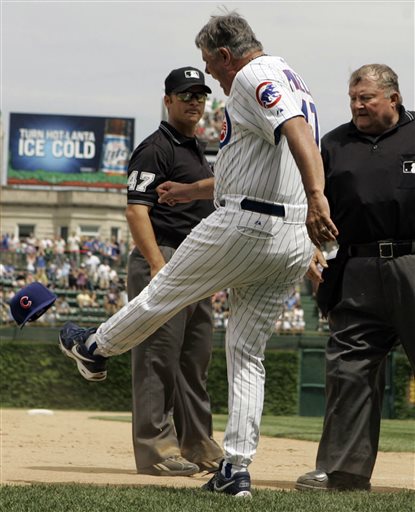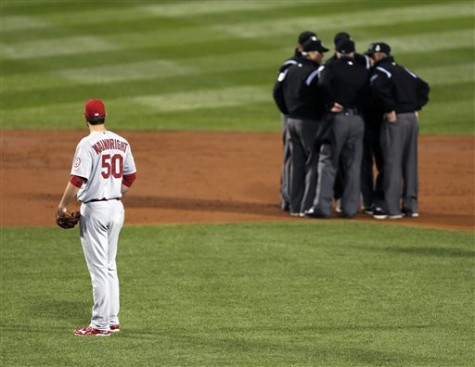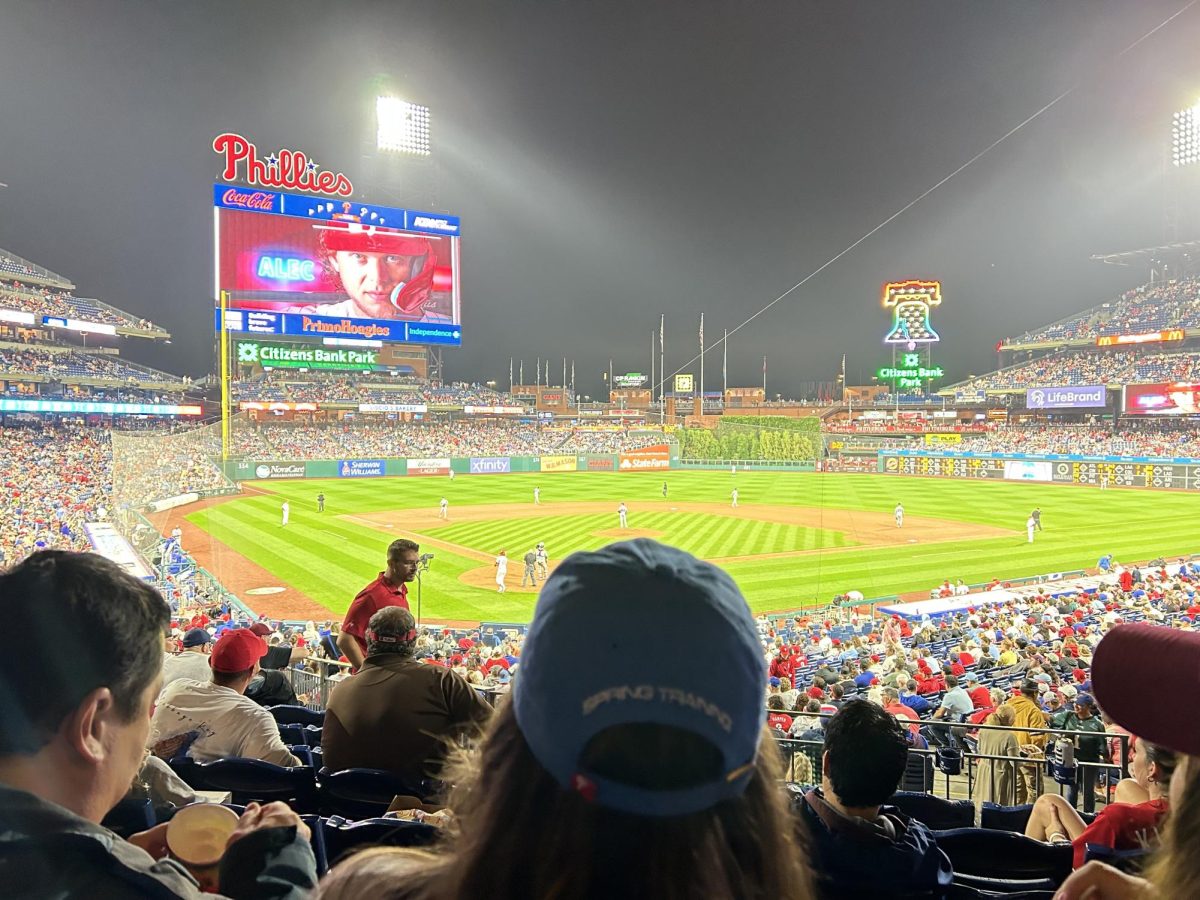Instant replay instantly spoiling baseball’s purity

FILE – In this June 2, 2007, file photo, Chicago Cubs manager Lou Piniella, center, kicks his cap as he argues with third base umpire Mark Wegner, left, and home plate umpire Bruce Froemming watches during the eighth inning of a baseball game against Atlanta Braves in Chicago. Major League Baseball announced Thursday, Jan. 16, 2014, that owners, players and umpires have approved a new instant replay system to review close calls. (AP Photo/Nam Y. Huh, File)
April 17, 2015
With the wintry death grip by which the entire United States was held captive finally relinquishing its grasp, the Boys of Summer have started yet another year of one of America’s most cherished traditions.
Baseball is back all across the country, and on every level — Little Leagues, school teams, professional teams, farm teams, college teams, community leagues, etc. The enticing allure of a hot dog is only matched by the tumultuous buzz of the crowd sporadically rising to a dull roar, and the faint smell of the infield dirt brings back the memories of games past.
Quite simply, there is something about the mystique of a new baseball season that carries a sense of genuine happiness from its coattails. Even if your favorite professional team is being projected to only win 68 games out of a 162 game season, as the Philadelphia Phillies are this year, the sight of white and red pinstripes is certainly a welcome one.
However, a new year means another swath of updated rosters and rule changes, not just to the Phils but to Major League Baseball as a whole. Changes have abounded across the last few seasons, with the implementation of video review and the addition of a coach’s challenge being the head-liners. Slowly, some of the oldest and most well-guarded traditions of baseball are being expunged.
Case in point; Wrigley Field is finally beginning to enter the 21st century. Considered one of the last remaining gems of old-school baseball, Wrigley Field has gone without a serious renovation for over 100 years. The addition of a new jumbotron in left-center along with the coming stands around the outfield and the removal of the outfield ivy marks not only a change in aesthetics, but hopefully the coming of a new age in Chicago Cubs baseball.
In a much broader sense, it also marks the end of 1920s style baseball in the whole of the MLB. Wrigley has had 100 Opening Days without the likes of a videoboard, large advertisements, and construction crews tirelessly placed around the ballpark. The coming of the 2015 season has finally brought that change to Chi-town, and frankly, it is saddening to see the last bastion of truly old school baseball give in to marketing pressure – even if that bastion has had a championship drought heading into its 107th year.
The overall change in baseball has been abundantly clear in the last few years. Gear has gotten more and more bright and vibrant, especially in events where players can choose what they wear such as the Home Run Derby. Pitching has reached a stifling level, and the advent of instant replay has made fielding defense even more stout.
But above all else, there is one aspect of baseball that has made it the most unique over the generations. Part of the overall contribution to a baseball game is the luck of the draw on umpire’s calls — for better or worse, these calls always brought a jubilant jolt of energy to the fans of teams that benefitted, while the woe of an obviously blown call added to a sense of dread for the rest of the game. These feelings were tailor-made for the game, and now they are an experience that future generations of Major League Baseball fans will never be able to grasp.
No one would deny that the umpires miss some calls every now and then but by removing the element of human judgment from the game, part of the magic sinks into this robotic vacuum of correction and finality.
No longer will you hear the barstool swan song of a group of guys arguing about the snuffing of Detroit Tiger’s pitcher Armando Galarraga and the humanity of his overall situation; the heartfelt apology by the umpire who blew the call on the last out, Jim Joyce, the hug in the following day’s game, Bud Selig’s refusal to rewrite the call and give Galarraga his perfect game, etc. The story of Galarraga was one of the highlights of the summer of 2010, with the general theme that baseball is very much a living, breathing sport. The story served as a testament of people forgiving mistakes, on the basis that we are all human and that we are all imperfect.

Instead, the integration of instant replay has taken away what made baseball so unique for so long. The human element of the game is being replaced by a need for 21st century technological accuracy. The MLB is beginning to drift in the direction of the NFL in that every fan expects the correct calls, all the time, for all the year. How long will it be before umpires themselves are removed from the equation entirely? If the new direction of pro baseball is to be quickly and efficiently correct, it makes no sense to keep any human element in a judgmental role. The league might as well equip sensors under home plate to determine balls and strikes, sensors on the bases to determine whether a runner is safe or out. When would it end? The long term effects of moves like these can force even more changes on America’s pastime, one that has been played relatively unchanged for the last 130 years.
With so many complaints amongst football fans that the NFL is on its way to becoming “arena football,” it would appear that a similar sentiment that baseball might eventually become “glorified T-ball” is only a few more rule changes away from being a main topic of discussion. The mystifying traditions of baseball are exactly what give the game great worth; most fans have no idea why it’s bad luck to walk on the foul line, or to run across the pitcher’s mound when entering or leaving the field. Common fans do not understand why players and coaches hold these flippant actions in such contempt, and that is a key part of the thrill.
The air of mystery is perhaps one of the game’s most sacred traditions, and by introducing all this new technology and style, the unique characteristics that makes baseball such an attraction are being viewed as vestigial obstacles of rudimentary efficiency.








